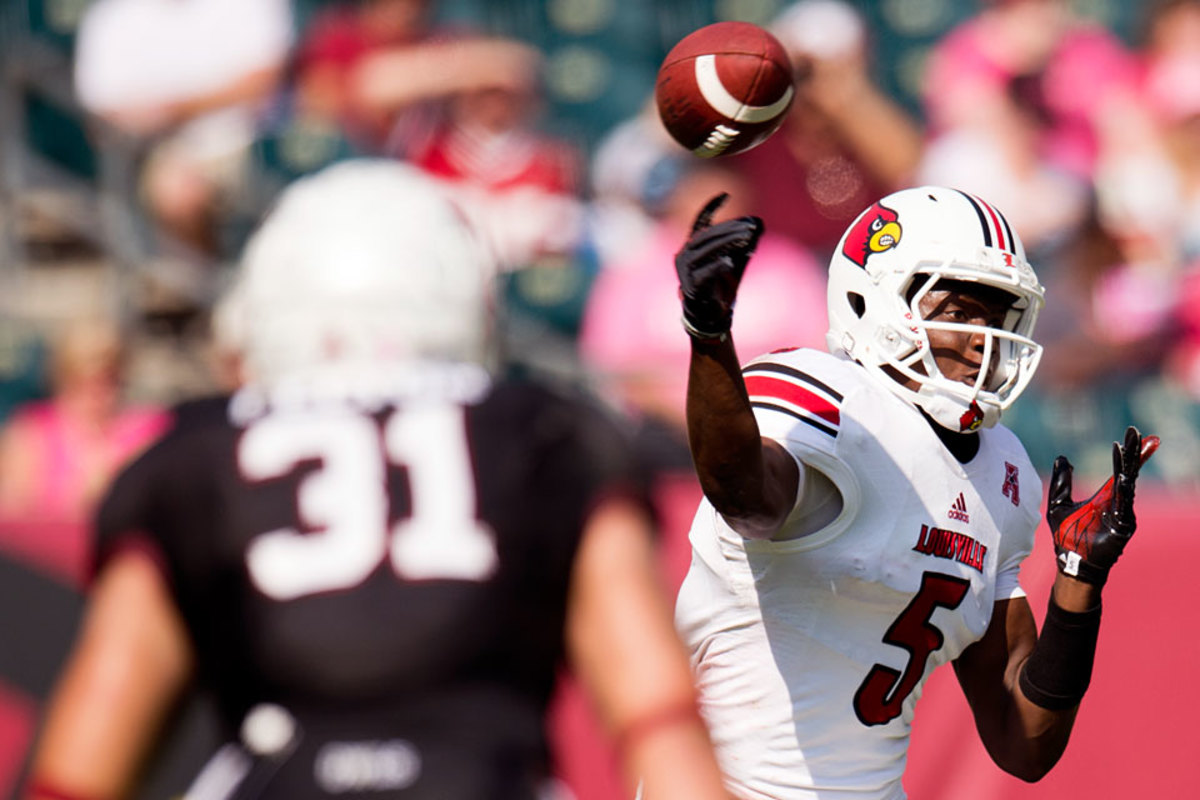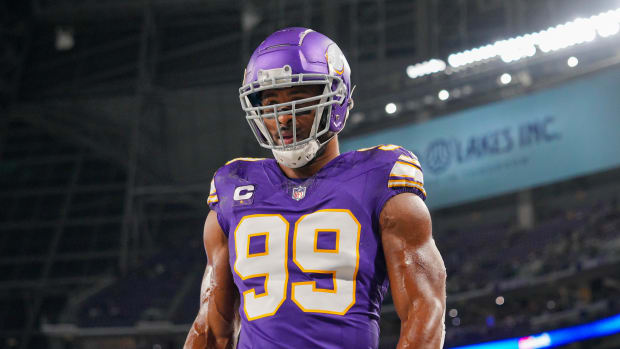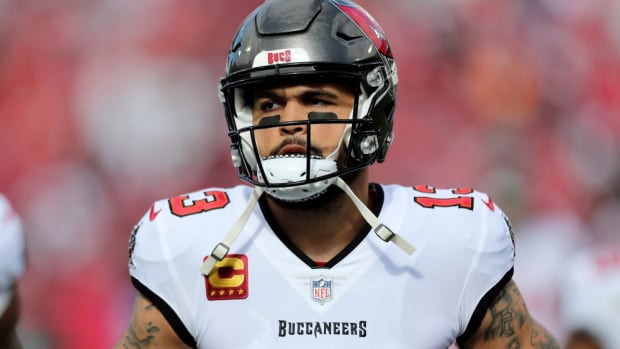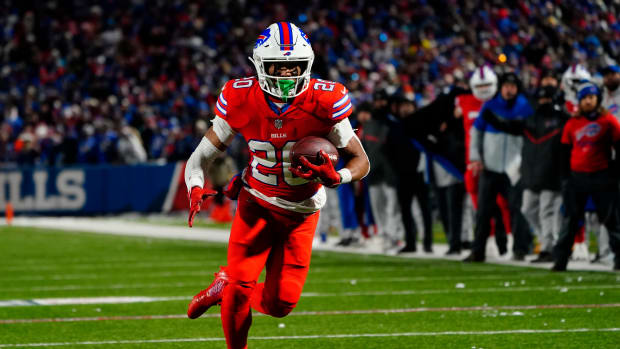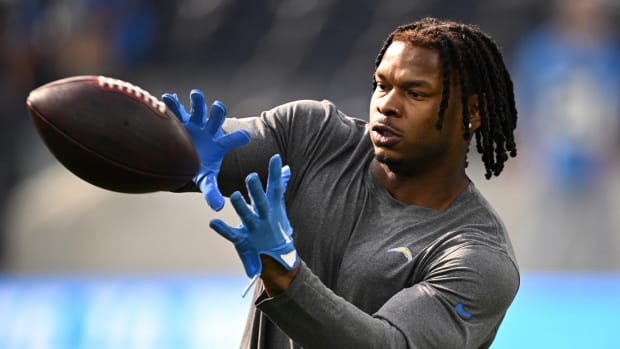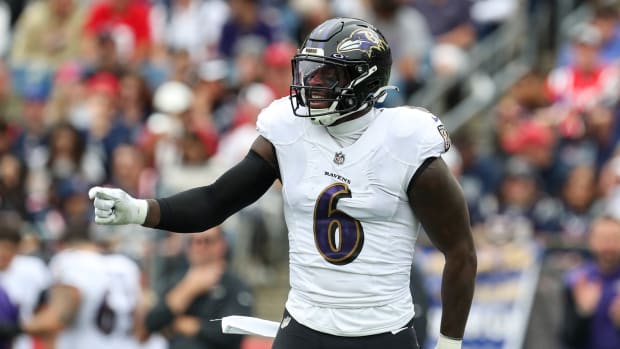The Skinny On Teddy
ORLANDO — He’s boring compared to the what-will-he-do-next flash of Texas A&M’s Johnny Manziel. He looks like a skinny bookworm next to the natural, all-around talent of UCLA’s Brett Hundley. And he hasn’t had many chances to exhibit the clutchness of Central Florida’s Blake Bortles.
Compared on film to other potential quarterbacks in his draft class, Louisville quarterback Teddy Bridgewater doesn't jump off the screen. But NFL teams still like what they see, and when they dig a little deeper, that like will turn to love.
Though he only turned 21 in November, there is no draftable quarterback more ready to be a face-of-the-franchise quarterback than Bridgewater. And he’s coming: Bridgewater announced Wednesday his decision to turn pro.
"Wait until [teams] talk to him and get him up on the blackboard," said an NFL personnel executive who has known Bridgewater since ninth grade. “He lives and breathes football. Always has. Teams are going to fall in love with him.”
That just begins to tell the tale of the football goodness that resides in the body of Bridgewater, who could land with the Texans as the top overall pick. Former Penn State coach and Patriots offensive coordinator Bill O’Brien will be the next coach in Houston, and he’ll get his pick of the quarterback litter. O’Brien, from being around Tom Brady, knows what greatness is and what it takes to get to that level. Expect O’Brien to like what he sees in Bridgewater. The more you learn about the Cardinals quarterback, the more you realize he shares may of the same qualities that made Brady, another skinny prospect who lacked the prototypical measurables, one of the greatest ever.
No one’s saying Bridgewater is destined for greatness; so many other factors determine ultimate success. But there’s little question that Bridgewater looks headed in that direction because of a terrific foundation rarely seen.
* * *
Bridgewater has had autonomy at the line of scrimmage since he was a sophomore and is asked to make more reads under center than any QB prospect in recent memory. (David E. Klutho/SI)
Bridgewater always has been mature beyond his years. His parents divorced when he was young, but he never let it affect him. Bridgewater was informed by his mother, Rose Murphy, that she had breast cancer when he was 14, just as he was entering Miami’s Northwestern High School. Bridgewater wanted to quit football to help pay the bills, but his mother never entertained the thought.
After a standout high school career, Bridgewater decided to decommit from the hometown Hurricanes—an extremely unpopular decision in the neighborhood—and go to Louisville. And in an example of his unflinching belief in his own talent, Bridgewater graduated high school early and enrolled at Louisville in the spring to position himself to win the starting job as a freshman. He earned it by the third game, and he never gave it up.
That’s just a brief glimpse into Bridgewater’s background. To explain why he is ready right now to lead an NFL franchise, both on and off the field, you have to begin with Cardinals offensive coordinator/quarterbacks coach Shawn Watson.
Off the field, Watson has filled the father-figure role in Bridgewater’s life. Neither can mention the other without tears streaming down their faces. “I love this kid,” Watson said, after Bridgewater and the Cardinals dismantled the Hurricanes 36-9 in the Russell Athletic Bowl. “He’s like my own.”
On the field, it’s been a perfect marriage. Watson began his career in the mid-1980s as an assistant at the University of Illinois under West Coast offense guru Mike White, who also had future NFL coaches Bill Callahan and Brad Childress on staff. At Louisville, Watson installed the same pro-style West Coast offense. While other college quarterbacks are looking to the sideline for their on-field adjustments, Bridgewater does it all by himself.
“I gave him the keys to the car as a sophomore,” said Watson, who has been a coach for 32 years. “I had never done that before.”
Bridgewater has vast responsibility at the line of scrimmage. First there is the kill system. Two or three plays are called in the huddle. Depending on the defense, Bridgewater has the ability to “kill” the first play, and run one of the others. It’s solely Bridgewater’s decision.
"Teddy's been taught from day one that I want him to be the coordinator at the line of scrimmage because he can be far better than me." —Shawn Watson
Bridgewater also has an audible system at his disposal, with the same goal as every good NFL system: stay out of bad plays. If the play Watson has called has little chance of success against a particular defense, Bridgewater can change the play entirely at the line of scrimmage.
Finally, Bridgewater redirects the offensive line protections by either identifying the middle linebacker in man-to-man protections, or directing the slide one way or the other in zone.
You’d be hard-pressed to find many, if any, college quarterbacks that are asked to do that much, especially at 21 years old and in a completely full-field read progression system. Most of the recent top drafted quarterbacks, like E.J. Manuel, Geno Smith and Robert Griffin III, came from systems that called for quarterbacks to only read half or a quarter of the field. Bridgewater has the ability to direct the ball to any part of the field on every snap.
“I study pro ball, that's what I do, that's my passion, my love. (NFL coaches) are the best at what they do, so I've made it what we do,” Watson said. “Most of these kids in college, the coordinator calls it from the press box and then there’s a signal system once the defense declares. The quarterback never gets developed, never gets taught. Teddy's been taught from day one that I want him to be the coordinator at the line of scrimmage because he can be far better than me. And he can put the ball wherever he thinks is right.”
Bridgewater’s been doing that for two years. This past season, he made just three mental mistakes when it came to adjustments at the line of scrimmage.
* * *
After every series, Bridgewater puts on a headset to go over each play with the offensive coordinator, who watches from the coaches box. (Al Tielemans/SI)
As far as physically playing quarterback, many questions will linger in terms of Bridgewater's measurables. He is certainly tall enough—he’s listed at 6-3, looks closer to 6-2—and has long arms, but he’s skinny at a listed 196 pounds. There’s no question he needs more strength for durability, but he’s still growing into his body and will benefit from an NFL training program.
A few NFL scouts have questioned the size of Bridgewater’s hands, which probably isn’t helped by the fact that he wears two gloves. (He’s done it since high school and it’s just a preference.)
“His hands are big enough. He has big hands, huge hands,” Watson said.
What you can’t help but marvel at with Bridgewater is how technically proficient he is at playing the position, especially at his age. From footwork to his release and subtle, yet important movements, Bridgewater is polished like few are. He’ll move a safety with a look to one side of the field, then fire the ball into the opening he just created. Bridgewater’s footwork selling a screen or play fake is exquisite. He always throws a tight spiral, rarely throws off balance, and he is not afraid to fit a ball into a tight window or throw deep. When it comes to facing pressure, Bridgewater is cold-blooded. He can move and create plays when he needs to, but Bridgewater lives in the pocket. No matter how the game is influenced by college offenses, that always will be of vital importance to the viability of a franchise quarterback.
Bridgewater does all that by showing the accuracy that NFL teams crave. For his career, Bridgewater completed 68.3 percent of his passes. Since posting 64.5 percent as a true freshman and after a come-to-Jesus exhaustive critique of Bridgewater’s game by Watson, Bridgewater completed 69.7 percent of his passes, including 71 percent this past season.
Both Watson and Bridgewater went into this season with a goal of throwing zero interceptions. Bridgewater threw four and two were off tips. Bridgewater went from throwing 14 touchdowns and 12 interceptions as a freshman, to 58 touchdowns and 12 interceptions his final two seasons combined.
Shawn Watson has served as Louisville's offensive coordinator and quarterbacks coach since 2011. (Timothy D. Easley/AP)
His superb attention to detail in his game shows his ability to not only take coaching, but also devour it and make it a passion.
“That’s what I love about him the most, that’s the student aspect of it that I just love,” Watson said. “Because when he’s covered, he goes to his checkdown. When he gets in trouble, there’s pressure, he goes to his checkdown. He doesn’t try to create something that can hurt a football team with forced throws. He’s the greatest manager in college football. There’s nobody better than him in college football. There’s a lot of great players out there, but he’s the best.”
That comes from the other essential part of who Bridgewater is and will be on the next level: the desire to be great. “He came to me and said he wanted to chase perfection,” Watson said.
When Bridgewater got his first glimpse of Watson’s full-field progression offense, he had never seen anything like it. He was overwhelmed. So Watson told Bridgewater to start doodling: take a pad of formations, with just the offensive line printed, and draw the offense. Bridgewater recited a play and then drew it: receivers and routes, he’d identify the movement key (the defensive player they’re reading), what the progression off that movement key is, the alerts, depth of drop—every single detail.
Bridgewater quickly filled up a pad and was bored by it. He needed more competition—another pillar of Bridgewater’s being—so Bridgewater put the entire Louisville offense into his Xbox football game. Then he put in the game plans for each game and threw against the coverages he would see.
“He just doesn’t stop,” Watson said.
Bridgewater also rarely loses, at anything. Receiver Damian Copeland is the only person to ever beat Bridgewater on the Xbox—on a controversial call Bridgewater still brings up—and no one has beaten Bridgewater since. He takes on all comers in the Thursday practice ritual of trying to hit the uprights from various distances. Bridgewater never stops competing.
But it is Bridgewater’s always-working mind that sets him apart. He’s a bit of savant that way. After every series, Watson and Bridgewater go over each play. He has instant recall of the coverages. When the team installs the top 25 plays for each game plan, Bridgewater barks out the play from memory before Watson can look down at his playsheet. “I swear he has a photographic memory,” Watson said. “He’s extremely intelligent.”
What other factors do you want to see in a franchise quarterback? Bridgewater has it all.
The ability to be a team leader and face of a franchise at a young age?
Everyone around the program agrees that Bridgewater has the type of infectious personality that naturally draws players to him. There are bound to be some rough patches, but Bridgewater will do what he always does: learn from his mistakes, move on by turning the page, and never make the same mistake twice.
Bridgewater has been the leader of the Cardinals offense ever since he won the starting quarterback job as a freshman. (David E. Klutho/SI)
Unselfish, team-first attitude?
Bridgewater personally pulled the plug on Louisville’s Heisman Trophy campaign. He didn’t want it to be a distraction to his teammates, or for them to feel that he was better than any of them.
Toughness?
With the Big East title and BCS berth on the line in a 2012 showdown with Rutgers, Bridgewater took the field with a severely sprained ankle and broken left wrist and completed 20 of 28 passes (71.4 percent) for 263 yards and two touchdowns in a 20-17 comeback victory.
* * *
The inner belief in one’s ability. The never-ending quest for perfection at playing the position. An almost unhealthy competitive streak. The ability to lead. The desire not to be seen as being better than one’s teammate. Undeniable toughness.
Those are the traits that the great NFL quarterbacks have. Bridgewater possesses them as well. There will be much said over the next few months, in the run-up to the draft in May, about what Bridgewater might lack in prototypical arm strength, size and other things you can see. But he possesses the potential for greatness because of the things you can’t.
































